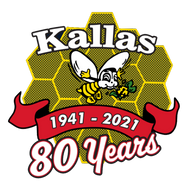Kallas Honey Farm began in 1941 when John Kallas developed an interest in bee keeping while helping a neighbor in Fox Point, Wisconsin tend to his hobby hive. As payment for Kallas' efforts, the neighbor gave him a hive. In only a few years, Kallas had close to 100 hives and a small processing operation. He enlisted his sons James and Gerald to help him sell the family's honey through door-to-door sales calls, farmers' market, and county fairs. Later, James and his dad expanded the business by tapping into the retail market, first negotiating with tiny mom-and-pop grocers, then pairing up with bigger supermarkets.
By 1955, Kallas Honey Farm had almost 1,000 hives scattered across Wisconsin, in Milwaukee, Ozaukee, and Washington counties. When demand for the honey increased, Kallas had to start buying honey from other local producers in order to fill their own orders. In the early '70s, the family decided to abandon beekeeping completely in order to concentrate on the processing, packaging, marketing, and distribution of their honey.
Kallas Honey Farm receives honey from producers all over the country, but mostly from the Midwest. It arrives at the facility in bulk as a raw, naturally crystallized solid, and is immediately placed in long-term storage.
Our customers ask us to handle the honey as gently as we can, so rather than pasteurize or cook it, we simply heat the honey to help it move through the plant. Rather than add filtering agents to make the honey clear like most major honey packers, Kallas allows the honey to pass through membranes that catch fine sediments. That is how we are able to label it unfiltered and uncooked.
The largest percentage of Kallas honey goes to supplying commercial food manufacturers, restaurants, and bakeries. In addition to honey, consumers can purchase other Kallas products such as pure or 20% maple syrup, maple sugar, honey mustard, honey barbecue sauce, comb honey, honey stix, whipped honey spread, dried bee pollen, pure beeswax, and granola.

